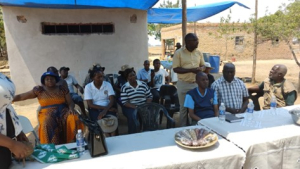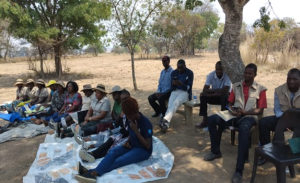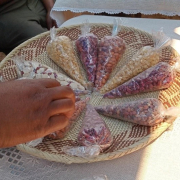District Food and Nutrition Security Committees (DFNSCs) form the nucleus for tackling food and nutrition security in a coordinated and holistic manner, with specific core functions. They lead the coordination of food and nutrition security activities at the sub-national level by providing a platform for interaction among relevant Government ministry representatives, development partners, academia and civil society. In this collaborative framework all stakeholders are accountable for ensuring that their sectors meaningfully engage and contribute to improving food and nutrition security at all their levels of operation within the identified national priorities.
Marondera West – In the vibrant community of Keal Farm, Ward 4, Marondera West, the Tamuka Group is making significant strides in agriculture and food and nutrition security. Comprising of six dedicated female farmers, this Agricultural Business Group is transforming their community by promoting self-sufficiency and sustainable farming practices. Initiated by Mrs. S. Dube from Mutoramhandwe A2 farm , with support from her husband the Tamuka Group exemplifies the power of collaboration and innovation in addressing local challenges.
Background
The formation of the agricultural business group arose from Mrs. Dube’s keen observation of the struggles faced by A1 farmers in her area, many of whom relied on casual labor despite having land. Recognising the potential for improvement, Mrs. Dube reached out to the District Food and Nutrition Security Committee (DFNSC) through the Department of Agricultural, Technical and Extension Services (AGRITEX) seeking assistance for the newly established group.
Since its inception, the group has actively participated in various agricultural shows at the ward, district and provincial levels, earning accolades for their impressive displays. Their hard work and dedication have resulted in tangible outcomes such as the establishment of a tuck shop and the acquisition of a grinding mill designed to process a variety of grains including small grains.
Products Produced by the Tamuka Group
The agricultural business group produces a range of products including:
- Baobab Juice
- Dried Beans
- Cooked and Solar-Dried Green Mealies (Mumhare)
- Processed Small Grains
A field visit to their site by the Food and Nutrition Council (FNC) and the District Food and Nutrition Security Committee reflected their commitment, with land preparation at an advanced stage and a well-constructed tuck shop that is nearly complete.

FNC Director General Dr George D. Kembo giving remarks during the field visit.
Key Stakeholders Involved
The success of the Tamuka Group is supported by several key stakeholders:
- Ministry of Lands, Agriculture, Water, Fisheries and Rural Development: Providing essential technical support to enhance the group’s agricultural practices.
- District Food and Nutrition Security Committee: Offering supervision and guidance to ensure the group meets its objectives.
Testimonials
The community-driven approach of the Tamuka Group has proven effective, as highlighted by testimonials from its members. One group member confirmed that the beneficiaries can now send their children to better schools without encountering fees arrears. This reflects the teamwork and collaboration that have become hallmarks of the agricultural business group.

Members of the Tamuka group (wearing reed hats) and members of the DFNSC following proceedings during the visit.
Outcomes and Impact on Food and Nutrition Security
The Tamuka Group has made significant strides in enhancing food and nutrition security in their community:
- Empowerment: The project has empowered individuals and the community to control their food supply, promoting self-sufficiency.
- Increased Food Availability: The initiative has improved the availability of food in Ward 11, Marondera West which has limited access to markets or grocery stores.
- Community Access to Food: The tuck shop will increase access to food for the local community, facilitating better nutrition.

The Tamuka Group tuckshop which constructed using the group’s profits.
Conclusion
The Tamuka Group’s journey is a testament to the transformative power of community collaboration and the critical role of women in agriculture. By fostering self-sufficiency and enhancing food and nutrition security, this group is not only improving their own lives but also uplifting their entire community.

